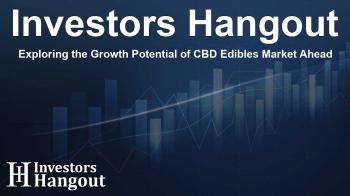Exploring the Growth Potential of CBD Edibles Market Ahead

The Future of the CBD Edibles Market
The CBD edibles market is experiencing remarkable growth, currently valued at approximately USD 13.63 billion in 2024. Projections forecast it to soar to nearly USD 38.01 billion by the year 2034, fueled by a robust compound annual growth rate (CAGR) of 10.8% from 2025 through 2034. This upward trajectory is largely attributed to the increasing consumer demand for functional and fortified food and beverage products incorporating cannabis compounds.
Market Dynamics Driving Growth
The shift towards health-conscious living has revolutionized the food and beverage industry, particularly amplifying interest in CBD-infused products. As beneficial cannabis becomes more accepted, consumers are increasingly seeking natural alternatives for health and wellness solutions. Insights indicate that consumers favor CBD edibles for their lower psychoactive effects, making them a safer choice for those hesitant about other cannabis forms.
Key Segments of the CBD Edibles Market
By Region and Performance
In 2024, North America commanded a significant share of 40% of the global CBD edibles market. The Asia-Pacific region is anticipated to be the fastest-growing market as consumer awareness about CBD’s health benefits continues to expand.
Product Type Overview
Among the product types, gummies maintain the largest market share, accounting for about 58% of the market. Supplements are projected to rise significantly in popularity as consumers look for ways to integrate CBD into their daily routines.
Innovative Trends in CBD Edibles
Consumer tastes continue to evolve, prompting manufacturers to diversify their offerings. Innovations now include CBD-infused chocolates, beverages, and even cooking sauces, catering to a broad range of consumer preferences. This expansion not only attracts new customers but also retains existing ones by continuously innovating product lines.
Precision in Product Development
Artificial intelligence has fostered dynamism in the CBD edibles sector, aiding brands in product innovation tailored to consumer preferences. By analyzing vast amounts of consumer data, brands can craft products that seamlessly fit into modern wellness regimens—be it for stress relief, sleep aids, or nutritional support.
Legal Outlook Affecting Market Growth
Market Legality Overview
The legal framework surrounding CBD edibles varies significantly worldwide. While some countries embrace CBD entirely, others maintain stringent bans. Most notably, the U.S. has federal regulations allowing hemp-derived CBD products containing less than 0.3% THC post the 2018 Farm Bill. However, state laws can differ, creating a complex landscape for manufacturers and consumers alike.
Regional Legal Variances
In Canada, CBD is fully legal and regulated under the Cannabis Act, providing a more straightforward path for products to reach consumers. Conversely, many Asia-Pacific countries still impose harsh restrictions on CBD, treating it similarly to high-THC cannabis, thus hindering potential market entry.
Challenges and Opportunities
Regulatory Challenges
Despite the booming market, regulatory hurdles pose significant challenges. Variations between countries can confuse operations for manufacturers. Stricter regulations can impact product availability and thus market growth.
Leveraging Product Innovation
On a brighter note, product innovation represents a noteworthy opportunity for growth within the CBD edibles space. Companies investing in R&D to create new flavors, textures, and forms of edibles can significantly enhance their market presence. The introduction of diverse CBD-infused products not only helps to attract new customers but also encourages repeat purchases among existing clients.
Market Insights and Final Thoughts
As the CBD edibles market continues to expand, tracking its evolution and understanding consumer preferences remains crucial for stakeholders. The projected growth of nearly USD 38.01 billion by 2034 speaks volumes about the sustained interest and potential that lies within this sector. With continued focus on wellness and innovation, the future seems bright for the CBD edibles market.
Frequently Asked Questions
What is the current market size of CBD edibles?
The CBD edibles market is currently valued at approximately USD 13.63 billion in 2024.
What is the expected growth rate for the CBD edibles market?
The market is projected to grow at a CAGR of 10.8% from 2025 to 2034.
What are the main drivers of the CBD edibles market?
The increasing consumer interest in health and wellness, coupled with the demand for natural alternatives, is driving market growth.
Which segment leads in terms of market share within CBD edibles?
The gummies segment held the major market share of 58% in 2024.
How does legal status impact the market?
Legal status greatly varies by region, affecting how products are marketed and sold globally.
About The Author
Contact Dominic Sanders privately here. Or send an email with ATTN: Dominic Sanders as the subject to contact@investorshangout.com.
About Investors Hangout
Investors Hangout is a leading online stock forum for financial discussion and learning, offering a wide range of free tools and resources. It draws in traders of all levels, who exchange market knowledge, investigate trading tactics, and keep an eye on industry developments in real time. Featuring financial articles, stock message boards, quotes, charts, company profiles, and live news updates. Through cooperative learning and a wealth of informational resources, it helps users from novices creating their first portfolios to experts honing their techniques. Join Investors Hangout today: https://investorshangout.com/
The content of this article is based on factual, publicly available information and does not represent legal, financial, or investment advice. Investors Hangout does not offer financial advice, and the author is not a licensed financial advisor. Consult a qualified advisor before making any financial or investment decisions based on this article. This article should not be considered advice to purchase, sell, or hold any securities or other investments. If any of the material provided here is inaccurate, please contact us for corrections.

